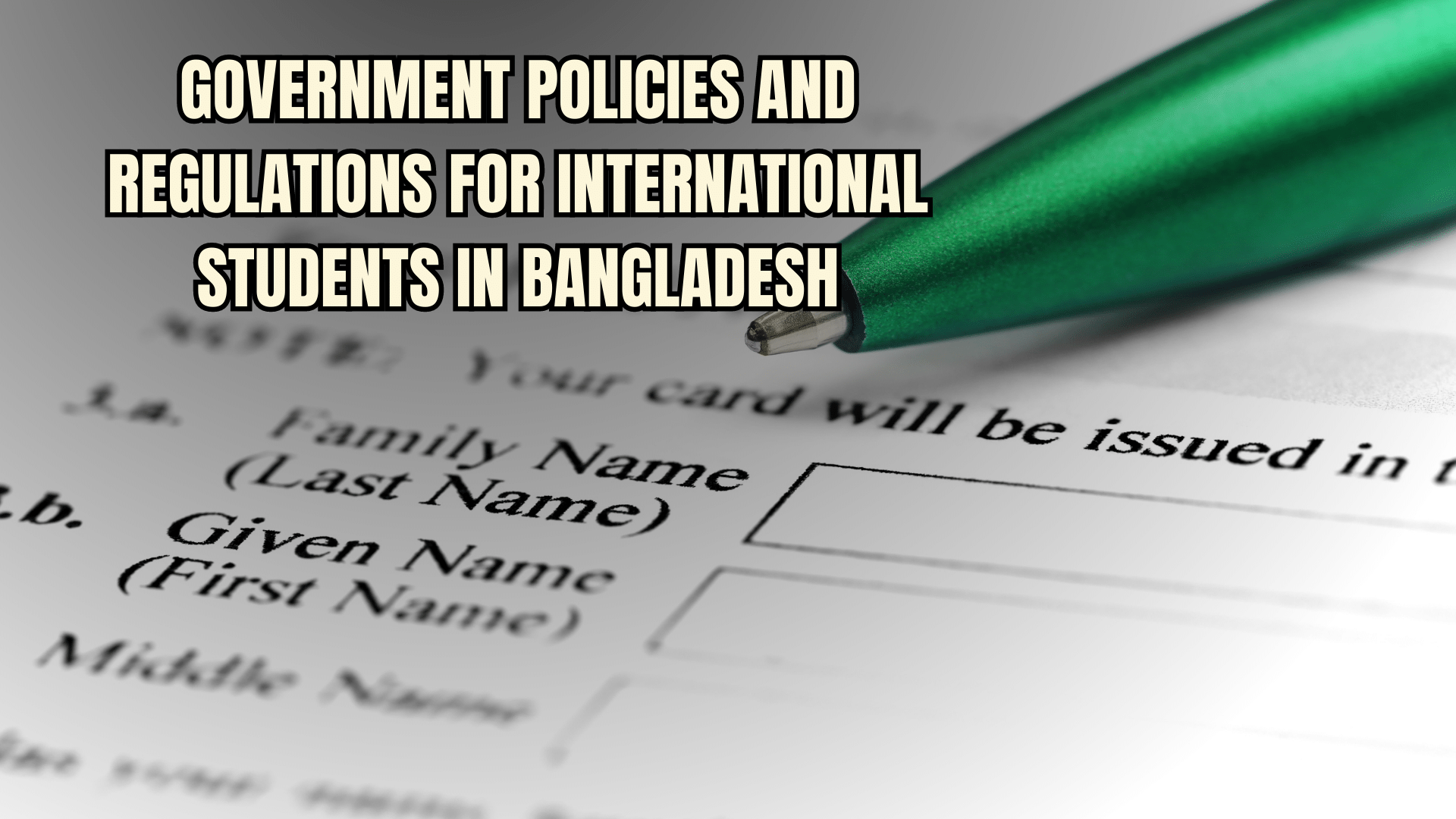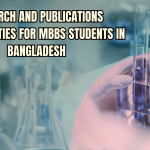Government policies and regulations play a crucial role in ensuring a smooth and streamlined experience for international students studying in Bangladesh. Understanding these policies is essential for prospective students who wish to pursue their education in Bangladesh. This article provides an overview of the government policies and regulations that govern international students in Bangladesh.
To study in Bangladesh, international students need to obtain a student visa. Bangladesh offers different types of student visas based on the duration and level of study. The visa application process requires specific documents to be submitted along with the application. Understanding the visa requirements and following the proper procedure is essential for international students to legally study in Bangladesh.
The admission process for international students in Bangladesh involves meeting eligibility criteria set by universities and institutions. These criteria may vary depending on the program and level of study. The application process typically includes submitting the required documents and may involve assessments or interviews. Once a student is selected, they can proceed with enrollment in their chosen program.
Bangladesh has specific educational policies and rules in place to ensure quality education for international students. These policies cover academic programs and course offerings, evaluation and grading systems, as well as attendance and discipline requirements. International students should familiarize themselves with these policies to adhere to the educational standards set by the institutions.
Bangladesh takes the safety and security of international students seriously. The government and educational institutions have implemented measures to ensure a safe environment for all students. Understanding the safety protocols, emergency procedures, and support services available will help international students feel secure throughout their educational journey in Bangladesh.
By being aware of the government policies and regulations for international students in Bangladesh, prospective and current students can navigate through their educational experience with ease and confidence. It is important to stay informed and updated on any changes or additions to these policies to ensure a successful and fulfilling time as an international student in Bangladesh.
Table of Contents
Visa Requirements for International Students
Navigating the intricacies of visa requirements for international students in Bangladesh is crucial for a smooth academic journey. In this section, we’ll uncover the essential details surrounding student visas, including different types of visas, necessary documents for visa applications, and the step-by-step process to secure a student visa. With these insights, you’ll gain a comprehensive understanding of the visa landscape, empowering you to pursue your educational goals in Bangladesh with confidence.
Types of Student Visas
When it comes to studying abroad in Bangladesh, there are different types of student visas that you should be aware of:
- F – Student Visa: This type of visa is for students who have been accepted to pursue a full-time academic program in Bangladesh. It allows students to stay in the country for the duration of their studies.
- J – Research Visa: For students who are conducting research or are enrolled in a research-based program, such as a PhD or a post-doctoral program.
- Exchange Visa: This visa is for students who are participating in an exchange program between their home country and Bangladesh. It allows students to study for a specific period of time and then return to their home country.
- Internship Visa: For students who have secured an internship opportunity in Bangladesh. This visa allows students to gain practical work experience in their field of study.
- Business Visa: Although not specifically a student visa, the visa can be used by students who want to start a business or engage in entrepreneurial activities in Bangladesh while studying.
It is important to note that each type of student visa has specific requirements and documentation needed for the application process. It is recommended to thoroughly research the specific requirements for the visa type that suits your academic goals and intentions in Bangladesh.
Documents Required for Student Visa Application
- A valid passport with at least six months of validity remaining.
- An offer letter or acceptance letter from a recognized educational institution in Bangladesh.
- A completed visa application form, which can be obtained from the Bangladeshi embassy or consulate in your home country.
- Passport-sized photographs, typically two or three in number.
- Evidence of financial support, such as bank statements, scholarship letters, or sponsorship letters.
- Proof of payment of the visa application fee.
- Copies of educational certificates and transcripts.
- A medical certificate confirming that you are in good health.
- A police clearance certificate from your home country.
- Proof of accommodation arrangements in Bangladesh, such as a letter of accommodation or a rental agreement.
- A travel itinerary showing your planned dates of entry and exit from Bangladesh.
Process of Obtaining a Student Visa
The process of obtaining a student visa in Bangladesh, also known as the Process of Obtaining a Student Visa, involves the following steps:
- Applying for admission: Before applying for a student visa, international students must first secure admission to a recognized educational institution in Bangladesh.
- Gathering required documents: The next step is to gather all the necessary documents for the visa application. This may include proof of acceptance from the educational institution, a valid passport, educational certificates, financial statements, and a completed visa application form.
- Submitting the visa application: Once the documents are ready, the student must submit the visa application along with the required fees to the Bangladesh Embassy or Consulate in their home country.
- Interview: In some cases, students may be called for an interview at the Bangladesh Embassy or Consulate. This is to assess the student’s intentions, background, and eligibility for the visa.
- Waiting for visa approval: After the application and interview, the student will need to wait for the visa approval. This process can take some time, so it is important to apply well in advance.
- Collecting the visa: Once the visa is approved, the student can collect the visa from the Bangladesh Embassy or Consulate. They should ensure that all the information on the visa is accurate.
It is important for international students to follow all the necessary steps and requirements to obtain a student visa in Bangladesh, as it is a crucial part of the Process of Obtaining a Student Visa. This ensures a smooth and hassle-free entry into the country for their studies.
Admission Process for International Students
International students considering studying in Bangladesh will find the admission process for universities to be an organized and well-structured system. This section delves into the various aspects of the admission process, including the eligibility criteria, application process, and selection and enrollment procedures. Learn how international students can meet the requirements, navigate the application process, and secure their place in a Bangladeshi university.
Eligibility Criteria for Admission
The eligibility criteria for admission, also known as the requirements for admission, are applicable to international students in Bangladesh. These criteria are essential for international students who wish to pursue their education in Bangladesh. It is crucial for international students to carefully review and understand these criteria before submitting their applications.
- Academic qualifications play a significant role in the admission process. International students are required to have completed their secondary education or an equivalent qualification with good grades.
- Language proficiency is another important criterion for admission. International students must demonstrate their proficiency in the English language. This can be done by providing a valid score in language proficiency tests such as IELTS or TOEFL.
- To complete their admission process, international students need to submit necessary documents. These documents include academic transcripts, certificates, passport, and photographs.
- Meeting the application deadlines set by the respective educational institutions is crucial for international students. They must adhere to these specified deadlines when submitting their applications.
- Financial ability is one of the requirements for admission. International students must prove their financial ability to cover tuition fees and living expenses during their stay in Bangladesh.
- Obtaining a valid student visa is essential for international students. They need to fulfill all the necessary visa application requirements to study in Bangladesh.
- International students may also need to fulfill health requirements. This can involve undergoing a medical examination and providing a health certificate to ensure they are in good health.
Before applying for admission, international students must ensure that they meet all the eligibility criteria. Seeking guidance from educational consultants or the respective educational institutions can be beneficial in understanding the specific criteria and any additional requirements.
Application Process
The application process for international students in Bangladesh involves several steps:
- Gather necessary documents: Collect all the required documents for the application, including educational certificates, transcripts, identification documents, and a valid passport.
- Research universities: Explore different universities in Bangladesh and their admission requirements. Determine which institutions align with your academic goals and interests.
- Complete the application form: Fill out the application form accurately and provide all the necessary information, such as personal details, educational background, and chosen program of study.
- Pay the application fee: Submit the required application fee as specified by the university. This fee is non-refundable and covers the processing of your application.
- Submit supporting documents: Attach all the required documents, including transcripts, recommendation letters, statement of purpose, and proof of English language proficiency.
- Submit the application: Send the completed application form and supporting documents to the university’s admissions office by the specified deadline. Be sure to follow any specific instructions provided by the university.
- Track application status: Monitor the status of your application through the university’s online portal or communication channels. Keep track of any additional requirements or updates.
- Receive admission decision: Wait for the university to review your application. Once a decision is made, you will be notified of your admission status.
- Accept the offer: If accepted, respond to the university’s offer of admission within the specified deadline. Follow the instructions to secure your place and proceed with enrollment.
Selection and Enrollment
The process of selecting and enrolling international students in Bangladesh includes specific steps and criteria. To gain admission to a university or college, you must meet the eligibility criteria established by the institution.
This may involve academic qualifications, language proficiency, and other requirements specified by the university. Once you have confirmed your eligibility, you can proceed with the application process. Along with the application form, submit the necessary documents such as transcripts, certificates, and identification proof.
Upon reviewing your application, the university will notify you of the selection decision. If you are chosen, you will receive an offer letter detailing the admission’s terms and conditions. To secure your enrollment, you must accept the offer and pay any applicable fees. It is important to be aware that there may be a deadline for accepting the offer, so ensure that you respond promptly.
During the enrollment process, you may need to participate in an orientation program. This program will provide you with important information about the university, its facilities, and the academic procedures. Strictly adhere to the university’s guidelines regarding course registration and attend any mandatory placement tests or interviews.
Please note that the selection and enrollment process may vary between universities. Therefore, it is crucial to thoroughly research and understand the specific requirements of the institution to which you are applying.
Work Opportunities for International Students
Landing in Bangladesh for your studies? Let’s talk about the exciting work opportunities that await you as an international student! This section dives into the various avenues available, including part-time work options, internships, and job placement support. Get ready to explore the local job market, discover the perks of gaining practical experience, and learn how these opportunities can enhance your university journey in Bangladesh. So, buckle up and get ready to embrace a world of professional growth alongside your academic pursuits!<\p>
Part-time Work Options
When it comes to part-time work options for international students in Bangladesh, there are several opportunities that can help them gain experience and support their financial needs. Here are some part-time work options to consider:
- On-campus jobs: Many universities and colleges in Bangladesh offer part-time job opportunities within the campus. These part-time jobs can include working at the library, administrative offices, or research projects.
- Tutoring: International students with expertise in a particular subject can offer private tutoring services to other students. This can be a great way to earn money while utilizing their academic skills.
- Freelancing: With the rise of online platforms, international students can explore freelance opportunities in fields like graphic design, writing, programming, and digital marketing. These flexible part-time jobs can be done remotely and provide a chance to work with international clients.
- Internships: Seeking internships in companies related to their field of study can provide international students with valuable work experience. It can enhance their practical skills and make them more competitive in the job market after graduation.
Pro-tip: Before starting any part-time work, international students should ensure they have the necessary permissions from their university and the government. It’s important to balance work with academic responsibilities to maintain good grades and progress towards their education goals.
Internship and Job Placement Support
When it comes to internships and job placement support for international students in Bangladesh, it is important to consider the following factors:
- Availability: Many universities and educational institutions in Bangladesh offer dedicated career services and placement support for international students.
- Internship Opportunities: These institutions frequently collaborate with local and international companies to provide internships in various fields of study. These internships offer valuable practical experience and help enhance professional skills.
- Job Placement Services: Universities may have career centers that assist international students in finding suitable job opportunities after graduation. These centers can provide assistance with resume building, interview preparation, and networking events.
- Industry Connections: Universities with strong industry connections can offer international students better access to job opportunities and potential employers.
- Workshops and Training: Some institutions organize workshops and training sessions to help international students develop the skills and knowledge needed for job applications and interviews.
- Networking Opportunities: Institutions often host networking events, career fairs, and job fairs where international students can connect with potential employers and expand their professional network.
- Support from Alumni: Universities may have alumni networks that offer support and guidance to current international students in their job search.
It is crucial for international students in Bangladesh to make the most of these resources and actively participate in career development activities to increase their chances of securing internships and job placements.
Healthcare and Insurance Coverage
When it comes to healthcare and insurance coverage for international students in Bangladesh, there are a few important things to consider:
- Medical facilities: Bangladesh offers a wide range of healthcare options, including hospitals, clinics, and specialized medical centers.
- Health insurance: It is crucial for international students to have health insurance coverage during their stay in Bangladesh. Health insurance provides financial protection against medical expenses and ensures access to quality healthcare.
- Coverage options: Students should carefully review the coverage options provided by their insurance plans. This may include coverage for hospitalization, doctor visits, prescription medications, and emergency medical services.
- Policy details: Students should be familiar with the terms and conditions of their health insurance policies. This includes understanding the coverage limits, claim procedures, and any exclusions or restrictions.
Fact: According to a recent study, more than 90% of international students in Bangladesh have health insurance coverage as a mandatory requirement for visa issuance.
Safety and Security Measures for International Students
When it comes to the safety and security of international students, Bangladesh has implemented several measures to ensure their well-being. Here are some key safety and security measures for international students:
- 24/7 Campus Security: Universities and colleges in Bangladesh provide round-the-clock campus security to ensure the safety of students.
- Police Helpline: The local police have designated helpline numbers specifically for international students, allowing them to report any safety concerns immediately.
- Student Support Services: Educational institutions have dedicated student support services to address any safety issues or emergencies faced by international students.
- Orientation Programs: Orientation sessions are conducted for international students to familiarize them with safety guidelines, emergency procedures, and local laws.
- Transport Safety: Universities and colleges provide safe and reliable transportation facilities for students, ensuring their security during commuting.
A true story that reflects the effectiveness of these safety and security measures involves an international student named Maria. While studying in Bangladesh, Maria encountered a situation where she lost her way while exploring the city. She quickly contacted the police helpline, and they guided her back to her accommodation safely. This incident highlights the efficiency and effectiveness of the safety and security measures in place to protect international students in Bangladesh.
FAQs
Ques 1. What are the rules and regulations for international students studying at Independent University, Bangladesh (IUB)?
Ans 1. International students studying at Independent University, Bangladesh (IUB) must hold a category-S visa and are required to provide proof of admission from IUB, sponsorship or a bank guarantee when applying for a visa. On-arrival visas or tourist visas are not permitted for studying at IUB. Please note that the Ministry of Home Affairs supports issuing visas to international students who meet these criteria.
Ques 2. How should international students inform IUB about their travel plans and accommodation details in Bangladesh?
Ans 2. Once accepted at IUB, international students must inform the Senior Officer, International Programs and Relations (IPR) about their travel plans and accommodation details in Bangladesh. The Senior Officer will make arrangements to receive the students at Hazrat Shahjalal International Airport in Dhaka.
Ques 3. Can international students change institutions within Bangladesh, and what is the procedure?
Ans 3. International students who want to change institutions within Bangladesh must obtain a No Objection Certificate (NOC) from their previous institution, an offer letter from IUB, and permission from the Ministry of Home Affairs. If they already have a valid visa, they only need to provide the NOC from their previous institution.
Ques 4. How can international students apply for a visa extension in Bangladesh?
Ans 4. International students are responsible for ensuring they have a valid visa and must apply for a visa extension at least two months before the expiration date. They need to submit an application form, a recommendation letter from IUB, and copies of their passport and previous visas. The process can take up to three months, and additional documents may be requested by a police officer for verification.
Ques 5. Can foreigners on work visas in Bangladesh study at educational institutions?
Ans 5. Yes, foreigners on work visas in Bangladesh may study, but they must obtain a No Objection Certificate (NOC) from their employer and permission from the Ministry of Home Affairs.
Ques 6. What are the penalties for overstaying in Bangladesh for international students?
Ans 6. There are penalties for overstaying in Bangladesh. Charges range from BDT 200 per day for the first 15 days to a maximum of BDT 10,000 per month, totaling BDT 30,000 for 90 days.







